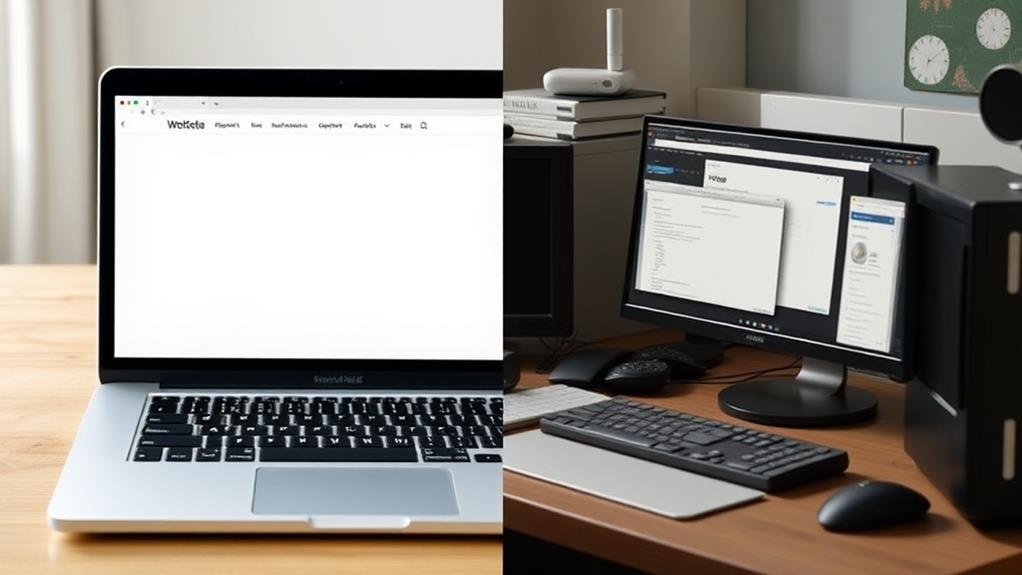
As you weigh the pros and cons of single-page websites, consider that they can augment user engagement, are quicker to develop, and provide a seamless experience. However, they can also limit your SEO efforts, make content updates challenging, and restrict design flexibility. On the plus side, they offer a simplified browsing experience, improved mobile usability, and reduced bounce rates. On the other hand, they can be tricky to navigate on smaller screens and make tracking user behavior complex. Now that you've got a sense of the key points, you'll want to examine each of these aspects in more detail to make an informed decision.
In respect of creating an engaging online presence, single-page websites offer a multitude of advantages.
With a single page site, you can enhance user engagement by condensing vital information onto one page, retaining visitors' interest more easily. This design and development approach allows for better control over the sequence in which users consume information, making it ideal for telling a story or showcasing a product.
Moreover, a single-page website is quicker and more affordable to develop, resulting in a consistent and immersive user experience with strong design delivered expeditiously.
Furthermore, single-page websites are perfect for mobile devices, being easier to optimize for mobile and navigate on small screens.
This is vital given the growing number of mobile users. A well-designed single page can increase engagement and conversion rates, as users can easily find what they're looking for and take action without having to navigate multiple pages.
With a clear call to action, you can guide users towards your desired outcome.
On balance, a single-page website can provide a seamless user experience, leading to higher conversion rates and a stronger brand impression.
While single-page websites offer a range of benefits, they also come with some significant drawbacks, particularly from the perspective of search engine optimization (SEO).
As you consider a single-page website, you should be aware of the potential challenges it poses to your SEO efforts. For instance, the limited space on a single-page website makes it difficult to place multiple keywords, which can negatively impact your search engine rankings.
Moreover, updating content on a single-page website can be a challenge, and if not done correctly, can harm your SEO performance. Moreover, single-page websites can lead to high keyword density, which can be penalized by search engines.
You'll also face limitations with meta descriptions, making it harder to attract clicks from search engine results. Google Analytics will provide you with limited insights, making it difficult to track user behavior and identify performance issues.

Scrolling through a single-page website can be an invigorating change of pace for users who are tired of clicking through multiple pages to find what they're looking for.
With a single-page website, you can easily navigate through the content without having to reload pages, making for a seamless and convenient user experience.
You've likely noticed that single-page websites can be a breeze to navigate on your mobile device, much like popular mobile apps. This is because single-page websites are designed to be mobile-friendly, providing access to the growing number of customers who shop and browse on their phones. However, this mobile-friendliness comes at a cost in regards to analytics.
| Mobile-Friendliness | Analytics |
|---|---|
| Provides access to mobile users | Makes tracking user behavior complex |
| Offers a smooth user experience | Limits insights on user behavior |
| Requires responsive design | Aggregates analytics data |
While single-page websites can be designed to be responsive, ensuring a smooth user experience across multiple devices, they can be challenging to navigate on smaller screens. This can lead to a poor user experience and high bounce rates. Additionally, analytics tools like Google Analytics provide limited insights on a single-page website, making it hard to track performance, identify areas for improvement, and optimize the user experience. This lack of granular data makes it difficult to set up and track specific goals and events, further limiting the usefulness of analytics in relation to.

As you weigh the pros and cons of a single-page website, consider the design and technical implications that can make or break your online presence.
In terms of web design, a single-page website requires expert skills to create a streamlined user experience.
However, this design process can be limiting, making it challenging to adapt to changing business needs.
These limitations can result in a poor user experience, high bounce rates, and limited scalability, making it crucial to carefully consider the design and technical implications of a single-page website.
With the pros and cons of single-page websites in mind, it's crucial to ponder the final implications of this design choice.
You must deliberate whether a single-page website is the best fit for your business, weighing its limitations against its benefits. If your website is performing well, users consume information quickly, and conversion rates are high, a single-page website might be the perfect choice.
However, if you have much content to present, users tend to feel overwhelmed, and SEO becomes a challenge. In one place, your site means simplicity, but it also means limited flexibility.
You must prioritize your business needs and weigh them against the pros and cons of a single-page website. Remember, it's imperative to ponder your target audience, the type of content you need to present, and your business goals before making a decision.
You're considering a one-page website, but you're unsure about its pros and cons. On the plus side, it's quick, cheap, and simple, with high conversions and fast loading times. However, it can be limiting for SEO, difficult to update, and overwhelming for visitors.
You're considering a single-page application, which can provide a seamless user experience, but may lead to slower load times, limited SEO capabilities, and difficulties in tracking user behavior and analyzing performance, making it vital to weigh the pros and cons carefully.
You're wondering if a single-page website is better than multiple pages. Well, it depends on your business needs; if you have limited products/services, a one-page site can work well, but if you need flexibility and SEO optimization, multiple pages might be a better fit for you.
You're wondering if a single-page website is bad for SEO? Well, the short answer is yes, it can be! With limited keyword targeting, poor internal linking, and high keyword density, you'll struggle to rank organically and may even face penalization from search engines.
As you deliberate the advantages and disadvantages of single-page websites, recollect that they can be a great fit for simple, narrative-driven projects, but may not be ideal for complex, data-heavy sites. While they offer convenience and a seamless user experience, they can pose challenges for SEO and analytics. By considering your project's unique needs and balancing design, technical, and mobile-friendliness considerations, you can decide if a single-page website is right for you.